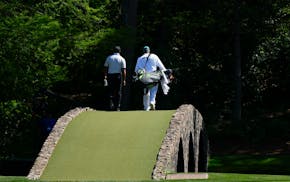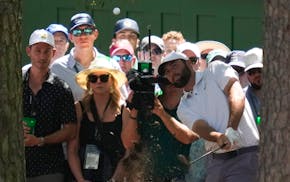When will baseball solve its competitive imbalance and stop giving first-place teams such as the Twins the first pick in the draft? It's not fair to the rest of the sport.
Tuesday, they returned to Target Field as the leaders of the American League Central and held that position even after a 7-3 loss to Colorado.
This is a surprise. After 35 games, the Twins are 19-16. Last year at this juncture they were 9-26.
Even without that juxtaposition, the Twins' improvement would be remarkable. They are a young, statistically inefficient team consisting mostly of the same players who lost 103 games last season.
Their All-Star closer hasn't thrown a pitch, their bullpen is mostly nerves and epoxy, and many of their supposedly key players have failed or flailed.
Perhaps only Miguel Sano and Ervin Santana are performing like All-Stars. Glen Perkins, Kyle Gibson and the bats of Byron Buxton, Joe Mauer and Jason Castro are absent or performing poorly. Despite one shining moment, Mauer is on pace to post career lows in every key statistical category, and on Tuesday he was given a day off following … a day off.
Somehow the Twins have improved dramatically without solving many of their problems. Statisticians might say the rise to first place is illusory and temporary, and they're probably right. After all, the games aren't played on paper. They're played on computers.
The view from inside the Twins' clubhouse is different. Brian Dozier sees improvements that might escape both the casual fan and the devoted analyst.
"I hear it all the time, via social media and in interactions with fans, you always try to pinpoint the difference," Dozier said. "But baseball is not like any other sport."
Dozier, as well as manager Paul Molitor, believe the rampant losing in 2016 led to a more incisive spring in 2017.
"When you set your mind to working on things, you can make a difference," Dozier said. "Our defense cost us so many runs last year. And not just the errors. I'm talking about the little things that no one ever sees, the kind of stuff that can't happen up here. When we set out to fix those things in spring training, it made a difference.
"The talent level in the big leagues is all right here," he said, describing a flat line. "The people and teams that succeed are the ones that don't make those little mistakes."
The Twins' greatest strength appears to be defense. Castro is an upgrade behind the plate. While Buxton hasn't hit, he might be the most spectacular outfielder in the game. His presence between Eddie Rosario and Max Kepler gives the Twins one of the best fielding outfields in the majors, and in franchise history.
Sano and Jorge Polanco have both exceeded expectations on the left side of the infield. And Molitor went out of his way to praise Mauer's glovework at first base.
Dozier said many of the defensive improvements have been because of greater studiousness and experience. And while the new front office and increased use of analytics can be credited for some of the defensive positioning, he also credited the young players themselves for forming a greater understanding of situational baseball.
The new front office brought in a new catcher, in Castro, and a new setup man, in Matt Belisle. Has the front office made a difference?
"It's easy to say that," Dozier said. "From my point of view, those guys are very interactive in here; we all feel like we're one. But to me, I feel, it's always been that way here.
"The biggest difference is the 25 guys inside this clubhouse and their mind-set, on how to win games. Last year we had a lot of first- and second-year players. Now you turn the page and you're not worried about your statistics. You learn that your statistics will be there in September. So you just find ways to win games.
"It's a beautiful thing. It really is."
Jim Souhan's podcast can be heard at MalePatternPodcasts.com. On Twitter: @SouhanStrib. • jsouhan@startribune.com

Souhan: Why Tiger Woods should keep swinging
Souhan: Scheffler wins Masters again, shows what makes him special
Morikawa falters in final round at Masters

Keeping up with the Joneses who helped design Augusta National's classic back nine


